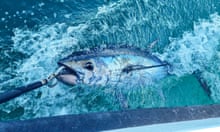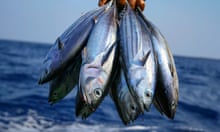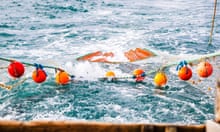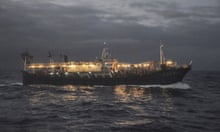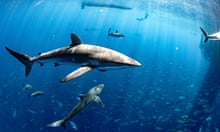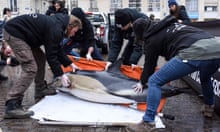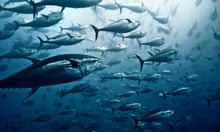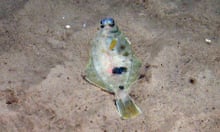Greenpeace activists have intercepted a 96-metre tanker in the Channel carrying fish oil from west Africa to Europe, to highlight the threat they say industry poses to food security and to livelihoods in the region.
Trade figures analysed by Greenpeace Africa show that fishmeal and fish oil exports from Mauritania alone have grown by an “alarming” 16% during 2020. Activists and locals say the industry pushes up prices and depletes stocks of fish eaten by local people across poor communities in Mauritania, Senegal and the Gambia.
“This is big business stripping life from our oceans and depriving our fishing communities of their livelihoods,” said Dr Aliou Ba, the oceans campaign manager for Greenpeace Africa. “This trade in fishmeal and fish oil is not sustainable. The fish that goes into fish oil and fish meal could be used to feed west African people.”
The Key Sund, a Norwegian-flagged vessel capable of carrying 4,500 tonnes of fish oil, the equivalent of 90,000 tonnes of processed fish, departed on 27 September from Nouadhibou, Mauritania. It was believed to be on its way to deliver part of its cargo to a fish oil company in France.
The EU is a leading market for west African fish meal and fish oil. About 70% of the fish oil exports from Mauritania went to the EU in 2019 and 76% in 2020, Greenpeace found.
The tanker’s owner, Sea Tank Chartering, said it was following international and local laws and conducting “ordinary business activities” that had the potential to improve the livelihoods of local people.
Each year more than half a million tonnes of fish are being taken from the coasts of Mauritania, Senegal and the Gambia and converted to fish meal and fish oil, used mainly in agriculture and fish farms, according to a report by Changing Markets, a Netherlands-based organisation, and Greenpeace Africa.
Hugo Matre, a spokesperson for Sea Tank Chartering, said: “We appreciate the work Greenpeace do in working for local vulnerable people. But as far as we are aware the trade has the ability to strengthen local entities, with the prospect of improving the livelihoods of local people.”
Asked about the findings of a UN working group that recommended a 50% reduction in fishing for overexploited sardinella species in west Africa, a key species used for fish oil and fish meal, Matre said: “That’s an important concern but it’s difficult for a single company to be involved in that kind of political issue.”
In Senegal, rocketing prices for sardinella and bonga, two species used in the fish meal and fish oil industry, are threatening the livelihoods of artisanal fishers.
The species, particularly sardinella, a staple food across west Africa, are overexploited, “posing a serious threat to food security in the subregion”, according to a UN Food and Agriculture Organization working group. The FAO has called for an urgent 50% reduction in fishing effort for sardinella species
Female fish processors and artisanal fishers in Senegal have held protests against their government’s issuing of industrial fishing licences to foreign vessels.
In the Gambia, artisanal fishers said they blamed their government for encouraging overfishing and allowing fishmeal plants to operate.
Sulayman Ndong, 34, an artisanal fisher from Gunjur in the Gambia, said: “Fishmeal and oil plants has caused a lot of damage on our marines. We have more catch before the coming of fishmeal plants but now our catches are depleting.
“The government is not doing their job in the way they should. They should not allow an industry that’s encouraging overfishing.”
Fatou Bojang, 42, a fish processor in Gunjur, said: “Before the coming of the fishmeal plant in Gunjur we used to have lots of fish to smoke and sell all over the country, but now we are facing competition with the Golden Lead factory.
“I am feeding my family and if such fishmeal plants continue to operate, my children going to school wouldn’t be able to go because I can’t afford the school fee and daily expenses. This will affect their future.”
West African production of fish meal and fish oil has increased more than tenfold over the past decade, from 13,000 tonnes in 2010 to more than 170,000 tonnes in 2019, the report by Changing Markets and Greenpeace shows.
Globally, 69% of fishmeal and 75% of fish oil is used for aquafeed to produce farmed fish such as salmon and trout.
Greenpeace Africa is calling for a 50% reduction in industrial fishing in the region to allow stocks to recover. It wants to see tighter, well-enforced regulation in west Africa and the EU to prevent over-exploitation in future and to stop unsustainably sourced fishmeal and oil products entering the EU market.
It is calling for a ban on fish fit for human consumption being used for fishmeal and oil, and for small-scale local fishers and processors to be given a formal legal status to protect their rights to their fisheries.


